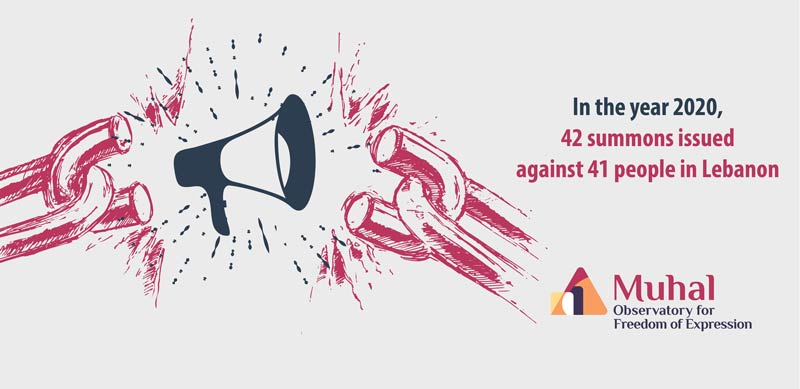Amid an increasingly failing economy, worsening political uncertainty, and indefinite lockdowns, people took to social media to express their dismay with the situation in Lebanon. Their complaints were met with summons and arrests under a variety of charges related to online speech.
Cases of arrests and summons have been steadily increasing since 2016, as reflected by Muhal’s previous statistics in 2018 and 2019. The October 17th demonstrations, the economic collapse, and the August 4th explosion left people with no choice but to express their anger and frustration at the government’s mishandling of these crises through critical speech on digital platforms. Characteristically, the government responded by using excessive force on the ground or by summoning people over their online statements. In the months following the uprisings and the explosion, “Muhal – Observatory for Freedom of Expression” reported a continuation of summons and arrests of people over their online speech.
Similarly to the previous year’s reports, members of Parliament and political figures filed the highest number of complaints, mostly under claims of “slander and libel,” with charges ranging from “slander and libel” to “offending the Lebanese president”. In addition, we’ve seen new charges against activists who supposedly undermined the financial status of the state. The past three years have witnessed a growing public engagement with economic and financial matters, following the devaluation of the local currency, bank scandals and a crashing economy. This has led more people to voice their legitimate concerns and disbelief in such flawed government and banking sectors.
Complaints and summons were issued against people from various professions, yet most of the accused were journalists and activists expressing their views on different online platforms, including Facebook and Instagram.
This year, the Cybercrime Investigation Bureau has continued to summon residents and ask them to sign a pledge to refrain from making further statements online, without a trial or a judge’s decision. Such impositions are illegal since the authority that summoned them did not have the right to force them into signing any pre-trial pledges. Signing such a pledge condemns the defendants without a trial being held, thus robbing them of their rights of fair trial and defense, which are protected and guaranteed by the UDHR.
In other cases, people were arrested for a detention period ranging from hours to days. This was seen by jurists and human rights advocates as a criminalization of peaceful speech and was considered legally unjustified.




